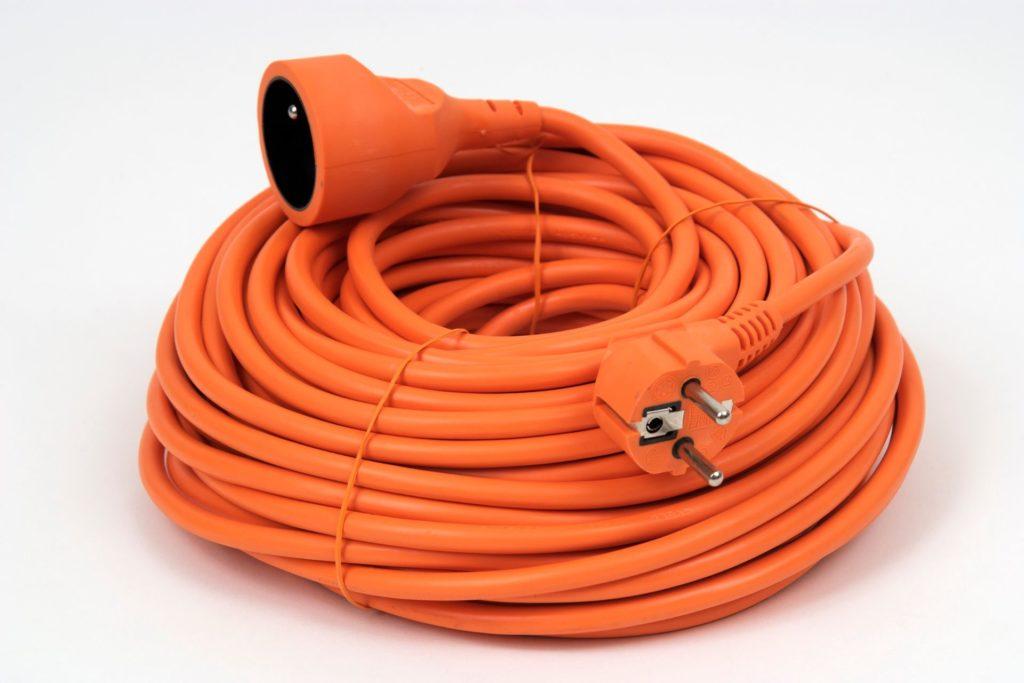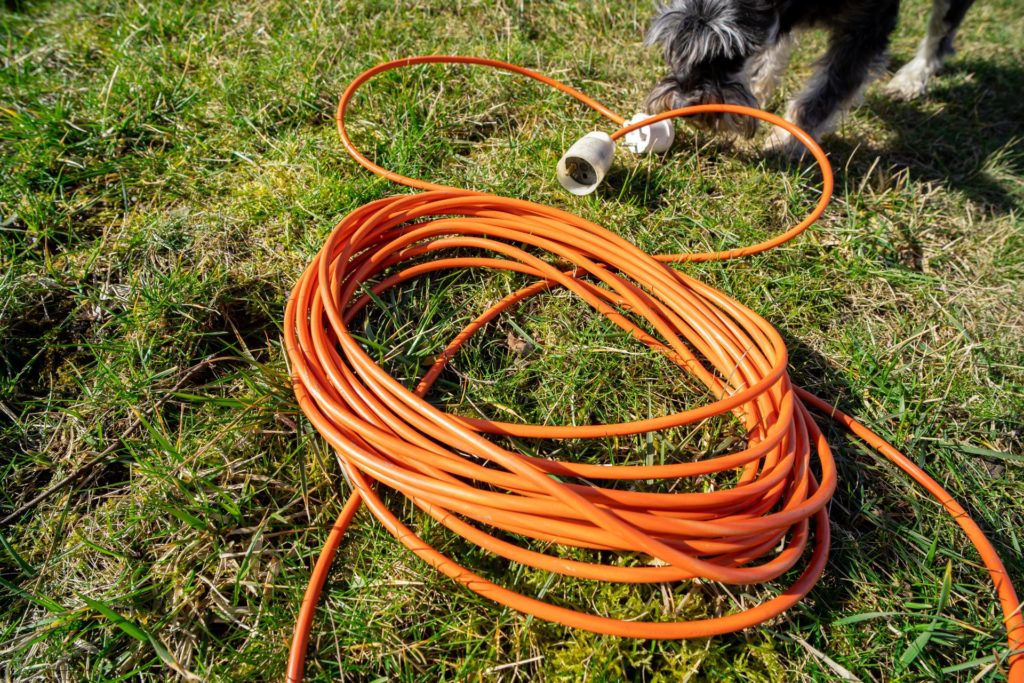Everyone uses extension cords these days. They can’t help it. Consumers have too many appliances and not enough outlets. Indoor extension cords are simple. They rarely attract confusion. Outdoor extension cords are different because they are more likely to get in the way, and people cannot help but wonder whether they can bury these devices.
Can You Bury An Extension Cord?
You can’t bury an extension cord because the cable cannot withstand the pressure, let alone elements like water. Pests are more likely to chew through the sheath, exposing the conductors to destructive elements like moisture. Once that happens, you will lose your cord. But that is not the worst-case scenario.
You are watching: Can You Bury An Extension Cord? (The Safe & Proper Way)
An underground extension cord is more likely to overheat. Any licensed contractor you consult will warn you about the dangers of covering these devices with rugs and carpets.
You don’t want to limit their ventilation because doing so allows the heat they generate to accumulate. Many extension cords start fires because someone covered the line with objects.
A buried extension cord is unlikely to start a fire. However, overheating can destroy the device. Unless you’re willing to replace your extension cord every few weeks, you are better off buying direct burial UF cables.
They can survive underground for long periods without overheating or deteriorating. Use direct burial UF cables to install permanent power sources next to the outdoor applications you want to operate.
Read Extension Cord Color Code
What Kind Of Extension Cord Can I Bury?
Manufacturers do not make extension cords for consumers to bury. The strongest extension cords can resist water and UV rays. However, they were not designed with direct burial in mind.

You can try searching for a UF-B extension cord but don’t expect to find it. If you want to bury cables, stick with electrical wiring. Run a UF-B line to the location with the outdoor appliance and install an electrical box at the end. This allows you to operate the machine without using an extension cord.
Read Can You Use An Indoor Extension Cord Outside?
Is It Legal To Bury An Extension Cord?
It is not legal. The NEC prohibits people from burying extension cords. You should check your local code for clarification. If it permits this practice, you can ignore the NEC’s regulations. The local code takes priority.
Read more : How to Weatherproof a Picnic Table (3 Easy Methods)
Read Can You Paint An Extension Cord? (5 Reasons Considered)
When Do I Need To Bury An Extension Cord?
You never need to bury an extension cord. Extension cords are not rated for direct burial.
If you’re tempted to bury your extension cord, it is probably because you want to hide it. Extension cords are helpful because they extend an outlet’s reach. However, they tend to stand out, which is why some people bury them.
They want to keep the cord out of sight. But if that reason sounds trivial. Extension cords are tripping hazards, especially outside, where people are less likely to notice them.

Hiding an extension cord in grass sounds reasonable until you realize that people are more likely to trip over it. This makes burial sound like an attractive solution.
But again, the dangers associated with burial are not worth the few benefits this practice brings to the table.
I can suggest you cover outdoor extension cords with tape. This reduces the chances of tripping while also camouflaging the cable.
A cheaper, more convenient option involves running the cord behind walls to keep it out of view. You can also use plants. Ultimately, burial is not the only solution at your disposal, despite what some people claim.
Pros & Cons Of Burying Extension Cord
Pros
- Prevents Tripping
- The cord won’t get tangled
- Burial protects the cord from threats like animals and extreme weather
Cons
- Pests will eat through the sheath
- The extension cord will overheat
- You may cut the cord while digging
- It can’t withstand the pressure
- Moisture is more likely to infiltrate the cord
Even If It Is Dangerous, How Do I Bury An Extension Cord?
- Make a plan. Identify the route the extension cord will follow. Avoid locations with electrical, water, and gas lines. Otherwise, you run the risk of accidentally cutting an electrical wire. Ask the contractor that installed those lines to guide you. More than likely, you have no idea where the lines are.
- Select a suitable extension cord. Prioritize the heaviest gauges you can find.
- Pull the extension cord through a conduit. The conduit provides an additional layer of protection. Select a pipe that fits your purposes. Some people prefer metal. Others gravitate towards plastic.
- Dig a trench. Follow the route you planned. The depth will depend on your local code’s regulations. This assumes that your local code permits this practice. If they don’t want consumers to bury their extension cords, they won’t say anything about the appropriate depth.
- Install the conduit and pull the cable through.
- Cover the conduit.
You can use these steps to install proper electrical wiring with a GFCI outlet at the end. If you have the time and resources to bury an extension cord, you might as well acquire a UF cable and bury it. This provides a long-term wiring solution.
Best Extension Cords For Burying
You shouldn’t bury extension cords in the first place. But if you’re determined to do so despite the danger, use these models:
1). Amazon Basics 100FT Extension Cord
This is a reliable 100-foot 125V 10A 1250W extension cord that works inside and outside. The heavy-duty 16AWG device has a three-prong plug. Expect copper wire construction and a vinyl sheath that repels UV rays, moisture, and abrasion. The item can run all your lighting and landscaping equipment.
Read more : Your Guide to Low Maintenance Tropical Plants
2). Clear Power 100FT Outdoor Extension Cord
This 125V 10A extension cord is weather resistant. It will stand the test of time if you run it along the ground. Additionally, the sheath is abrasion-resistant and flame retardant. That doesn’t sound particularly important if you want to use the device indoors.
But if you intend to bury the cord, you will appreciate the fact that it can survive in settings with temperatures ranging from -40 to +140 degrees F. The blades are nickel-coated brass. As such, they are less likely to corrode. For that reason, you don’t have to worry about arcing.
The extension cord was tested thoroughly by agencies in the USA and Canada. They certified it, giving consumers like you some peace of mind. You can trust the product’s reliability and efficiency.
3). UltraPro 25FT Extension Cord
This is a 13A 125V 1625W extension cord with three outlets. It can accommodate exterior applications like outdoor lighting. The plug is durable, boasting a one-piece molded construction.
If the cord’s reliability worries you, you should know that this product is UL listed. You should avoid electronic devices that don’t have UL certification because you cannot trust them to perform as expected.
4). Camco Extension Cord
This is a 125V 30A extension cord with NEMA TT 30P and NEMA TT 30R connectors. The 10-gauge cord is strong enough to survive the rigorous conditions it may encounter in an exterior setting.
The PVC sheath is heat-resistant and flame-retardant. It can withstand the wear and tear of temporary burial. The plug has a solid grip that simplifies the process of pulling it out of an outlet. You are less likely to damage the cord.
This extension cord is versatile. You can use it for various applications, including boating, Rving, and camping.
The cord is thick enough to transmit significant volumes of current without overheating.
Source: https://gardencourte.com
Categories: Outdoor

